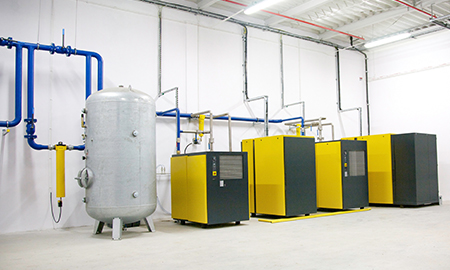Why does an air compressor overheat?
Most air compressors today are fitted with safety cut outs that will automatically stop an air compressor if it detects that something within the compressor is wrong. The aim of this is to prevent the compressor from doing serious damage to itself. Normally with a bit of maintenance the compressor will run again without a problem after one of these issues has been detected and the compressor has shut itself down.
One of the most common reasons an air compressor stops working is if it overheats. We recently surveyed out service technicians for the most common reasons they have had to attend emergency (not pre-planned) customer visits. The number one reason by a long way was air compressor overheating.
Unfortunately the reasons behind why a compressor is overheating are very varied but in this article we will look at the most common causes of an air compressor overheating
Inadequate ventilation
Probably the most common reason an air compressor overheats is due to poor or inadequate ventilation of the plant room. All air compressors need a huge amount of cool atmospheric air to keep the compressor cool. It needs to be remembered that air compressors generate a huge amount of heat. In fact probably 80% of the energy put into the compressor is given off as heat, so a 30KW compressor is probably giving off over 20KW of heat. This heat needs to be disposed off and the cooling air passing over the compressor takes this heat away.
If the compressor is located in a small plant room (and they usually are) if the cooling air isnt given a chance to escape the room very quickly will become too hot to cool the compressor and the compressor will overheat.
Solutions
- – Build adequate ventilation into the plant room with louvres, ducting, fans etc
- – Make sure these louvres remain clear and free of debris (we often see plants growing over louvres of people have left pallets of product or plant in front of louvres)
- – If your installation is large or with multiple compressors use ductwork from the outlet of the compressor direct to atmosphere and give adequate fresh air ventilation to allow cool air into the plant room
Lack of oil
Another very common reasons that air compressors overheat is lack of oil. The oil or coolant in a compressor is there for a number of reasons. Lubrication is one of these, sealing gaps to prevent high pressure air escaping around internal components is another but the third and one of the most important reasons it is there is to move heat away from the compression element of the compressor (the compression element may be the screws in a screw compressor or pistons in a piston compressor). The oil flows around the compression element, lubricating and sealing but also capturing heat. The oil is then collected and after going through other items such as separators and filters it is pumped through a cooler to the heat it has collected can be disposed of. This is where the heat given off the compressor talked about in the section above comes from.
If the compressor doesnt have the right amount of oil, each litre of oil has to carry more heat and has to be circulated more quickly. Eventually this will get to a point where it cant cope with the amount of heat and the compressor will overheat.
Solutions
- – Keep the compressor topped up with oil to the correct level
- – Use the correct specification of oil
- – Make sure you do your daily checks on the compressor so you spot any problems early before they become a failure issue.
Air Leaks
If your downstream pipework or equipment is using a lot more air than the compressor can supply the compressor will run constantly. Assuming the compressor isnt a piston compressor which should only have a 50% usage factor, running flat out shouldn’t be an issue as long as the compressor is properly maintained and regularly checked. Having said this this isnt a situation you want to get into. Any air systems needs to have some ‘free’ capacity available to make up for unusual or higher than normal demand.
If your air demand increases above what is expected, it is usually due to leaks in your pipework or attached equipment. Checking for leaks and fixing them is a very cost effective way to reduce un-expected demand. Air leaks can put a lot of strain on to your compressor, which can result in overheating unless it is in perfect shape. Air leaks are also a complete waste of energy and money and are like leaving a hot water tap running all day.
Solutions
- – Regularly fix air leaks in your compressed air system
- – Make sure your air compressor is sized correctly for your likely air demand.
Notes:
The heat given off by air compressors is a great way to save money. Rather than waste this heat to atmosphere why not re-use it to warm your factory or process water. Click here to find out more about heat recovery
A plant room needs to be cool. If the plant room is too warm this actually makes the air compressor less efficient so the compressed air you use costs you even more energy (money) to make.
Make sure you do your air compressor daily checks, so you spot issues early and can solve any problems you see before a failure occurs.


